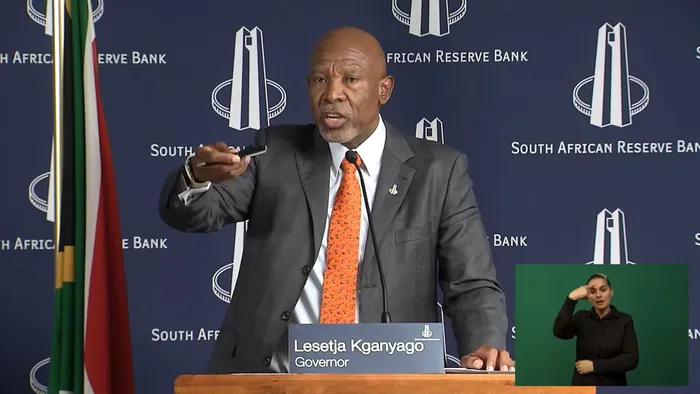
The Reserve Bank expects inflation to peak at 4% this year.
Image: SA Reserve Bank.
Even as the South African Reserve Bank expects inflation to move higher in the coming months, its Monetary Policy Committee (MPC) this afternoon elected to keep rates on hold.
Today’s decision leaves prime at 10.5%. Previously, there had been a 1.25 percentage point decline between last September and the last meeting in July.
Etienne Raubenheimer, the head of CFO Services at Outsourced CFO, said that stable rates provided households with a level of certainty.
However, Raubenheimer added that “the challenge, is that budgets are already stretched, and consumers will only feel real relief once rates begin to ease”.
Inflation is rising as expected, the governor said, and is likely to peak at around 4%, including higher electricity inflation of 8% instead of 6%, SARB Governor, Lesetja Kganyago, said this afternoon.
SARB anticipates that headline inflation will rise over the next few months, peaking at around 4%.” Our forecast now incorporates higher electricity price inflation, of nearly 8% rather than 6%,” Kganyago said.
Kganyago singled out electricity price hikes as a major issue.
The governor said that the recent pricing correction by the National Energy Regulator of South Africa, which saw a R54 billion under recovery through previous tariffs that customers now have to pay for, was pushing inflation higher.
“This is a reminder of the serious dysfunction in administered prices, which undermines purchasing power and weakens growth. The solution to this crisis is not a higher level of inflation, but rather sector-specific reforms to improve efficiency,” Kganyago said.
“With inflation expectations still above target and administered prices set to rise, the MPC’s most powerful lever today is credibility, not a token cut,” said Liam Dawson, portfolio manager at PMX.
The rate of increases in the cost of living slowed to 3.3% in August from 3.5% previously.
The main drivers of the 3.3% annual inflation rate were housing and utilities, while food and non-alcoholic beverages.
Pleasingly, grocery price increases slowed from a brutal 5.7% in July to a more manageable 5.2% in August.
However, the reserve bank said inflation was at the second-highest level this year.
“Inflation has risen in recent months mainly because of meat, vegetables, and fuel prices that are declining more slowly than they were earlier.”
The central bank notes inflation is projected to revert gradually to 3%, averaging 3.6% in 2026 and 3.1% in 2027, after peaking at 4% this year.
Most economists see it at around 4% towards the end of the year.
Kganyago said that the bank was raising growth prospects to 1.2% based on stronger second quarter economic growth. However, the governor said he did not want to focus too much attention on one number.
Economists had seemingly been split between a 0.25 percentage point decline and rates held stable.
The next meeting is scheduled for November.
IOL Business
Related Topics: